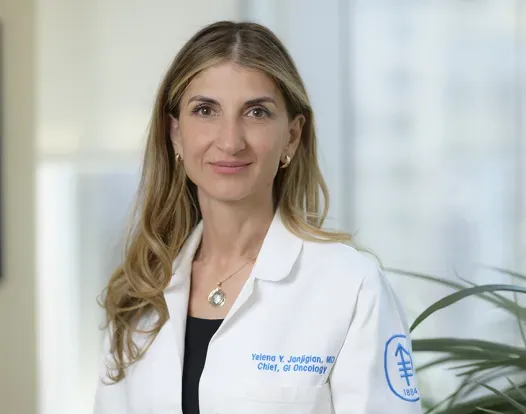These researchers dedicate their careers to finding new treatments and cures for people with cancer.

Photo Credit: Memorial Sloan Kettering Cancer Center
Whenever someone walks onstage during the Plenary Session of the Annual Meeting of the American Society of Clinical Oncology (ASCO), they do so knowing that thousands of eyes and ears are finely tuned to every word they speak, every graphic or data point they share, and every outcome they explain. For most, if not all, it’s a career-defining moment, one that validates years—sometimes decades—of painstaking research, collaboration, patience, and perseverance.
For Dr. Yelena Janjigian, it was also a natural progression in a career dedicated to improving outcomes and prolonging the lives of patients with gastric and esophageal cancer. The recipient of multiple Conquer Cancer grants and awards—including a Young Investigator Award (YIA) and a Career Development Award (CDA)—Dr. Janjigian is a gastrointestinal (GI) medical oncologist and chief of the GI oncology service at Memorial Sloan Kettering (MSK) Cancer Center, where she oversees development and strategy for the world’s largest GI oncology group. She also founded and now leads the MSK gastroesophageal cancer therapeutic accelerator (GCTA), which brings together physician-scientists, patient advocates, and collaborators from across four different continents to help accelerate therapeutic development for people with this disease.
Here, Dr. Janjigian discusses the impact early-career Conquer Cancer funding had on her career and ultimately helped forge her path to the plenary stage.
You won both a Young Investigator Award and a Career Development Award from Conquer Cancer. Could you talk about the impact that it had on your career, including the research you presented during this year’s Plenary Session?
You don’t just walk in and embark on a transformative study. You start with smaller, investigator-initiated studies, and Conquer Cancer funded two of mine. The foundation supported my early career endeavors, and it’s so deeply appreciated.
Often, especially for young researchers who are just finding their way, it can be hard to know if your ideas are truly as good as they sound in your head. Putting yourself out there to be judged can be so scary. No matter how big or small the grant, funding means someone thinks your time and ideas are valuable and have promise. In a way, Conquer Cancer was an early investor in my work and my career leading up to this point.
What would you say to an early-career investigator out there who is struggling to secure funding and perhaps even losing hope?
Anyone who goes into academic research has to be able to absorb and learn from failure. So many experiments, you design them, and you analyze them, and you realize there’s nothing there. So, you move on. For my Conquer Cancer CDA, I won it on my third attempt. And every time I submitted, my application was a little bit better. It’s often just a matter of figuring out how to do it and whether the field is ready for it.
I think that willingness to keep trying and to persevere is really what differentiates people who succeed versus people who just do okay. You have to put away your ego and decide how badly you really want something. Don’t take it personally, remain passionate about what you do, and keep homing in on your hypothesis. If your ideas are clear—especially in rare diseases like gastric and esophageal cancers—you can really make an impact.
There’s a lot of uncertainty out there right now when it comes to research funding. When you think about the current state of the funding landscape, what worries you most?
What worries me is the uncertainty we’re seeing and the impact it will have on our profession long-term.
Looking back to when I first joined faculty 15 years ago, it’s impossible not to wonder what would have happened if I hadn’t gotten my grant. If I hadn’t gotten my YIA or my CDA from Conquer Cancer, maybe I would have decided my work or ideas weren’t supported and gone into private industry.
And it’s not just my generation, or the next generation after mine. It’s the generations of researchers to come and the people who come after those people. There’s a domino effect, where even just a subtle impact on these fragile connections we build can be devastating long-term.
When it comes to conquering cancer, a lot of people have their own unique definitions of what it means to do so and what the world might look like when cancer has been conquered. With that in mind, what does conquering cancer mean to you?
Whenever my patients ask, “Can you cure me?” I usually tell them that it depends on how they define the word cure.
To me, conquering cancer means that my patients continue to live and do what they want to do. They have the chance to watch their children get married. They get to have grandchildren. They get to grow old complaining about things that have nothing to do with their disease or treatment or side effects. We’re already achieving this for some patients, even those diagnosed with what was previously considered incurable metastatic disease. And I do think we can and will continue to see more of that in my lifetime.
To learn more about Conquer Cancer and the research we support, visit www.conquer.org/cancer-research.
Last Updated: 07/02/25